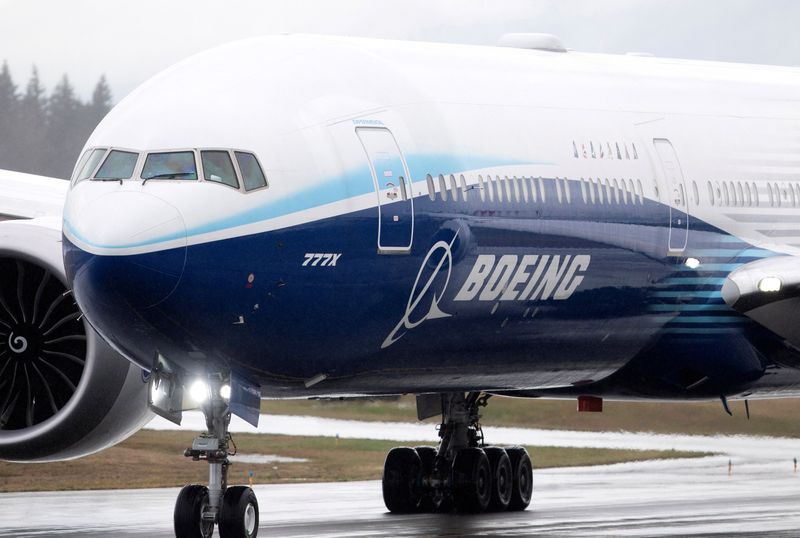By Uday Sampath Kumar and Eric M. Johnson
(Reuters) -Boeing Co said on Wednesday it incurred $4.5 billion charges in the fourth quarter on its sidelined 787 program, obscuring the U.S. planemaker's long-awaited return to positive cash flow fueled by rebounding 737 MAX deliveries.
The planemaker sank to a loss after two quarters of profits because of the charges. Shares in Boeing (NYSE:BA) fell 3.6% as the array of charges and uncertainty over the 787 program dwarfed a surprise return to positive free cash flow and plans to increase production on the 737 and 777.
The quarterly results underscore the challenges Boeing faces as it seeks to rebound from the coronavirus pandemic and 737 MAX safety crises, while navigating industrial and regulatory currents on its bigger 787 and 777X flagship.
Its ability to resume deliveries to airlines depends on approvals from the U.S. Federal Aviation Administration.
Reuters reported last week that deliveries of the 787 are expected to remain frozen for months as U.S. regulators review repairs and inspections over structural flaws in the jets, while designs for the larger 777X face further regulatory pushback from Europe.
"We'll have to complete the rework on a large fleet of airplanes," Calhoun told analysts on a conference call later on Wednesday. "There's no way to shortcut it ... I wish it could go faster, and I can't accelerate it."
Asked whether deliveries would resume in April, as some people in the industry expect, Calhoun said the timing would be set by the FAA.
The program remains at a low production rate, with an expected gradual return to five per month over time, Boeing said. Calhoun and Chief Financial Officer Brian West later told investors on a call 737 MAX deliveries and service would resume in China's crucial aviation market in the first quarter.
Boeing unveiled a $3.5 billion pre-tax non-cash charge related to 787 delivery delays and customer concessions, and another $1 billion in abnormal production costs.
Boeing had previously forecast low production rates and rework for the 787 due to manufacturing flaws and required inspections and repairs to result in about $1 billion of abnormal costs - putting the overall price tag at some $5.5 billion.
"Here we go again," Vertical Research Partners analyst Rob Stallard said. "Just as we saw with the 737 MAX, Boeing is now racking up massive charges on the 787 with no firm end in sight, and its fate in the hands of the FAA."
HAIR-THIN GAPS
At its U.S. factories, Boeing is combing through parked 787s with ultrasound devices and tools to measure gaps barely visible to the naked eye. The gaps - left in the process for making carbon-composite structures that make the jet lighter and cheaper to fly - are the width of a human hair but violate Boeing's specifications.
The company reported a core operating loss of $4.54 billion in the fourth quarter ended Dec. 31, compared with a loss of $8.38 billion a year earlier, when the company recorded a $6.5 billion charge due to delays in its 777X jet program.
Still, Boeing generated positive cash flow in the fourth quarter, representing its first positive cash quarter since early 2019, fueled by 737 MAX deliveries as air travel rebounds from the pandemic. 2023 cash flow would be "materially" higher than 2022, West said.
Boeing said its 737 program was producing at a rate of 26 per month, up from 19 jets in the earlier quarter. It said it was on track to reach production targets of 31 per month in early 2022, though it faces supply-chain risks like labor and parts shortages.
Boeing currently has 335 737 MAX airplanes in inventory, and anticipates delivering most of those jets by end-2023, it said.
Boeing also said it aims to increase its 777/777X production to 3 aircraft per month in 2022 from 2 previously, fueled by orders for 777 freighters amid booming air cargo demand. It reiterated plans to deliver the first 777X in late 2023.
Higher revenue and operating margins in its Global Services Division were hurt by an asset-impairment write down of $220 million due to fluctuating demand and pricing, Boeing said.

Boeing also took a $402 million pre-tax charge on its KC-46 tanker program, due to changing customer requirements to the plane's remote vision system and supply chain disruptions.
Debt fell to $58.1 billion from $62.4 billion at the beginning of the quarter, Boeing said.